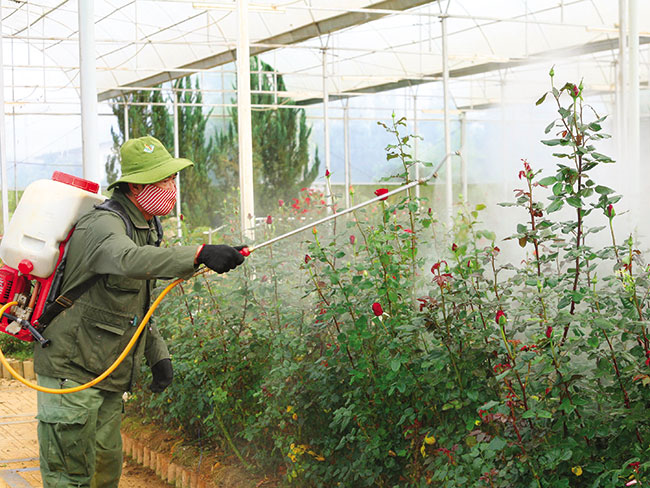Japan sows seeds of agri-investment

Japan’s investment in Vietnam’s agriculture sector has spiked suddenly last year-Photo: Le Toan
According to Japanese investment consulting firm Seiko Ideas Corp., Japan is now increasing its agro-forestry-fishery investment capital in Vietnam as it must open up its own agricultural sector to certain sensitive items once it enters the Trans-Pacific Partnership (TPP).
As a result, Japanese agricultural products will have to compete on pricing with similar produce from other countries. This puts Japan at quite a disadvantage as its own agricultural sector is defined by its small scale and costliness.
“Therefore, Japan has decided to boost investment into Vietnamese agriculture as Vietnam is a TPP member with huge potential in this sector,” said a Seiko Ideas document on the TPP’s impact on Vietnam-Japan agriculture co-operation. “When exporting to Japan, the tax rate will be zero per cent. At the same time, this can meet the condition that export products must have 70 per cent of intra-TPP origin.”
According to Seiko Ideas, while Japan needs a key partner for agricultural development, Vietnam needs a relevant “padlock” to access state-of-the-art agricultural technology.
The Japan International Co-operation Agency (JICA) said that it would increase its support to Vietnam’s agricultural sector through various projects invested in by Japanese firms.
“The number of Japanese firms wishing to implement agro-fishery projects in Vietnam has been strongly growing. Many are conducting market surveys,” said JICA Vietnam Office chief representative Mutsuya Mori.
For example, Kato Group is co-operating with the south-central province of Binh Dinh in a $771,000 tuna-fishing project, which will run until June 2020. Also, Shudensha Company is implementing an $820,000 project to improve water quality in the fishery sector. This project’s lifetime runs from 2015 to 2020.
OTA Kaki Company has been co-operating with the Central Highlands province of Lam Dong in a project to develop a high-quality flower market with an effective distribution system. This project will last through 2016.
Also, Nikko Foods Company is also working on an $820,000 project to develop high-quality tomatoes in Lam Dong.
“Vietnam’s agriculture has big potential. For instance, under our survey in Lam Dong, if local farmers replace coffee trees with a flower plantation, their income will rise nine fold,” Mori said.
Last year, out of new Japanese investments totalling $1.3 billion in Vietnam, there was a sudden upsurge of
agro-forestry-fishery projects. The 82 Japanese projects initiated last year bought the negligible percentage of Japanese agro investments to 6 per cent, putting it in the third-place ranking for newly-committed capital, after manufacturing (51 per cent) and construction (28 per cent).
According to Seiko Ideas, Japan is co-operating with Vietnam though its “Payroll Outsourcing” model. Specifically, Japanese firms, through outsourcing, will pay salaries for their farming employees in Vietnam. It means that they come to Vietnam as trans-national companies, hiring local labourers to implement their agricultural investment projects. This model is becoming increasingly popular as hired companies recognise the importance of personnel consulting services, including recruitment, salary payment, relocation, and performance assessment. As such, this service offers a high level of assurance for corporate customers.
What the stars mean:
★ Poor ★ ★ Promising ★★★ Good ★★★★ Very good ★★★★★ Exceptional
Latest News
More News
- Site clearance work launched for Dung Quat refinery upgrade (February 04, 2026 | 18:06)
- Masan High-Tech Materials reports profit: a view from Nui Phao mine (February 04, 2026 | 16:13)
- Hermes joins Long Thanh cargo terminal development (February 04, 2026 | 15:59)
- SCG enhances production and distribution in Vietnam (February 04, 2026 | 08:00)
- UNIVACCO strengthens Asia expansion with Vietnam facility (February 03, 2026 | 08:00)
- Cai Mep Ha Port project wins approval with $1.95bn investment (February 02, 2026 | 16:17)
- Repositioning Vietnam in Asia’s manufacturing race (February 02, 2026 | 16:00)
- Manufacturing growth remains solid in early 2026 (February 02, 2026 | 15:28)
- Navigating venture capital trends across the continent (February 02, 2026 | 14:00)
- Motivations to achieve high growth (February 02, 2026 | 11:00)
















 Mobile Version
Mobile Version